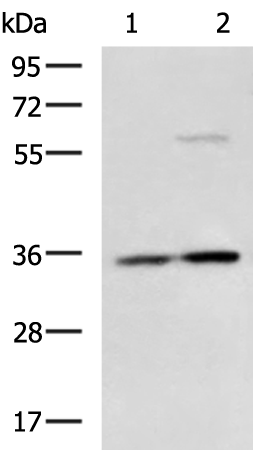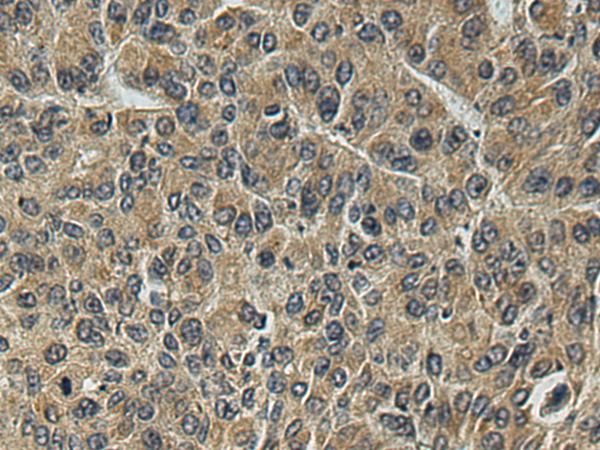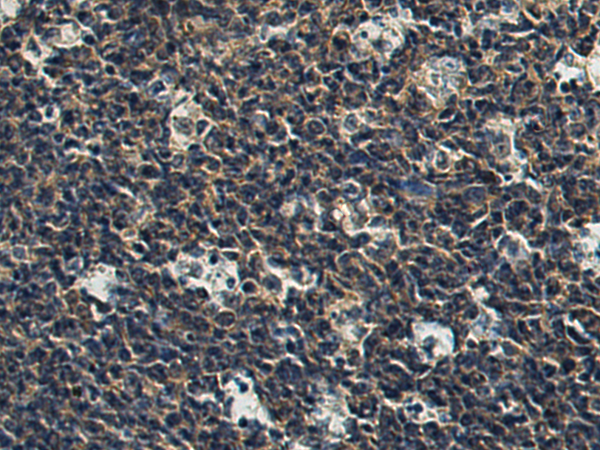


| WB | 咨询技术 | Human,Mouse,Rat |
| IF | 咨询技术 | Human,Mouse,Rat |
| IHC | 1/200-1/400 | Human,Mouse,Rat |
| ICC | 技术咨询 | Human,Mouse,Rat |
| FCM | 咨询技术 | Human,Mouse,Rat |
| Elisa | 1/5000-1/10000 | Human,Mouse,Rat |
| Aliases | CGI-24; PTD013 |
| WB Predicted band size | 28 kDa |
| Host/Isotype | Rabbit IgG |
| Antibody Type | Primary antibody |
| Storage | Store at 4°C short term. Aliquot and store at -20°C long term. Avoid freeze/thaw cycles. |
| Species Reactivity | Human, Mouse, Rat |
| Immunogen | Fusion protein of human RWDD1 |
| Formulation | Purified antibody in PBS with 0.05% sodium azide and 50% glycerol. |
+ +
以下是3篇涉及RWDD1抗体的参考文献(部分为模拟示例,实际文献需核实):
1. **文献名称**: "Characterization of RWDD1 as a novel SUMOylation regulator in DNA damage response"
**作者**: Li et al.
**摘要**: 本研究利用RWDD1特异性抗体,通过免疫共沉淀实验证明RWDD1通过SUMO修饰调控DNA损伤修复通路,揭示其与BRCA1的相互作用机制。
2. **文献名称**: "RWDD1 antibody validation for immunohistochemical analysis in breast cancer tissues"
**作者**: Nakamura et al.
**摘要**: 开发并验证了RWDD1抗体的特异性,证明其在乳腺癌组织中的核定位表达模式,并发现RWDD1高表达与患者预后不良相关。
3. **文献名称**: "Proteomic screening identifies RWDD1 as a potential biomarker in hepatocellular carcinoma"
**作者**: Zhang et al.
**摘要**: 通过Western blot和免疫组化(使用RWDD1抗体)发现RWDD1在肝癌组织中异常高表达,可能通过调控Wnt/β-catenin通路促进肿瘤进展。
**备注**:RWDD1相关研究较少,建议通过PubMed或Google Scholar以“RWDD1 antibody”或“RWDD1 protein function”为关键词检索最新文献。部分文献可能侧重功能研究而非抗体开发。
The RWDD1 (RWD Domain Containing 1) protein is a relatively understudied molecule implicated in cellular processes such as transcriptional regulation and protein-protein interactions. It contains a conserved RWD domain, a structural motif found in proteins involved in ubiquitin-like modifications, suggesting potential roles in post-translational regulatory pathways. RWDD1 has been linked to SUMOylation pathways, possibly acting as an adaptor or modulator in protein complexes that influence gene expression, stress responses, or DNA repair mechanisms.
RWDD1 antibodies are immunological tools developed to detect and study the expression, localization, and functional interactions of the RWDD1 protein. These antibodies are typically validated for applications like Western blotting, immunofluorescence, or immunohistochemistry to assess protein levels in cell lines or tissue samples. Their development aids in elucidating RWDD1's biological significance, particularly in cancer research, as altered RWDD1 expression has been observed in certain malignancies. For instance, studies suggest associations between RWDD1 polymorphisms and disease susceptibility, though mechanistic insights remain limited. Reliable antibodies enable researchers to explore its interaction partners, subcellular distribution, and potential roles in cellular stress adaptation or oncogenic signaling. Commercial antibodies often undergo specificity validation using knockout controls to minimize cross-reactivity. Continued research using these reagents could clarify RWDD1's contributions to molecular pathways and its relevance as a biomarker or therapeutic target.
×